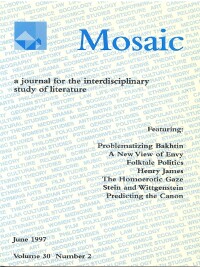Issue 30.2
Overview

General Issue
Published: June 1997
View the issue introduction or see the issue summary and contents below.
7 essays, totalling 144 pages
$15.00 CAD
This general issue of Mosaic contains essays that engage a range of philosophical questions concerning language, emotion, and sexuality. The essays address Mikhail Bakhtin’s carnivalesque and intoxication, envy in Miguel de Unamuno’s Abel Sánchez, gender in “Rapunzel’s” sources, homoerotics in W.H. Auden, Wittgensteinian language in Gertrude Stein’s work, and questions concerning canon formation.
Carnival, Creativity, and the Sublimation of DrunkennessMarty Roth Theories of carnival and carnivalesque art protect their institutions from the taint of intoxication through the suppression of that term. Nevertheless, as theorized by Mikhail Bakhtin and others, carnival is a site where creativity follows almost impulsively upon profound mood alteration. The connection between carnival and intoxication is left to emerge through slips, puns, metaphors and the testimony of carnivalesque literature. | |
Unbearable Alterity: Using Unamumo to Reconceptualize EnvySilvia Tubert Focusing on Unamuno’s retelling of the Cain and Abel story in Abel Sánchez, this essay is designed to challenge and extend current theorizing about envy. Instead of being regarded as a contingent passion provoked by external factors, envy is seen as a precursor to desire and as a potentially problematic but also essential component in ego formation. | |
Maidens and Their Guardians: Reinterpreting the “Rapunzel” TaleLaura J. Getty Predating the tale of Rapunzel published by the Grimm Brothers is a “Maiden in the Tower” version that differs significantly in structure and implications. This essay locates these earlier versions in their cultural and historical contexts with a view to elucidating the ways that variations in folktales encode changing attitudes toward issues of power and gender. | |
Appealing to the Crowd: Henry James and the Science of PopularityRichard Salmon During the 1890s, Henry James oscillated between two radically different conceptions of the relationship between artist and public. This essay examines James’s attempt to transform himself into a popular dramatist whilst maintaining a position of esthetic autonomy in the light of contemporary anxieties surrounding the formation of a “mass” culture. | |
Auden and the Homoerotics of the 1930s DocumentaryMarsha Bryant W. H. Auden’s connections to the British documentary film movement invite us to consider the homoerotics of documentary’s male-on-male gaze. This essay shows how coal miners—“real men” of Britain’s industrial North—functioned as objects of bourgeois male identification and desire in literary and cinematic texts of the 1930s. | |
“Wittgen-Stein”: Toward a Creative Philosophy of LanguageJoseph Cunningham The fundamental issues raised by Gertrude Stein in her “radical language experiment” (1905-20) bear a remarkable resemblance to the problems posed by Ludwig Wittgenstein in his later philosophy of language. This essay examines ways in which exploring the connections between the work of the two can refine our understanding of each. | |
Two Laws of Literary History: Growth and Predictability in Canon FormationWillie van Peer Focusing on the difference between traditional hermeneutics and more scientifically oriented approaches to literature, this essay argues that our understanding of currently debated issues—such as whether a canon should and/or can be abolished—is significantly increased if one formulates nomological theories that can be empirically tested. To stimulate further research of this kind, two “laws” of literary history are proposed. |